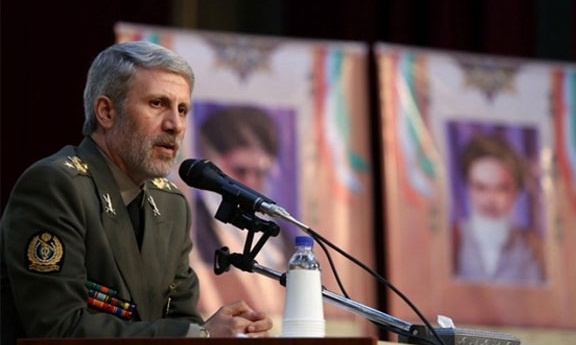Defense Minister: Iran to Give Crushing Response to Enemy's Possible Threats
 TEHRAN (FNA)- "These threats and sanctions have no impact on the Iranian nation's morale and willpower," Brigadier General Hatami said on Saturday.
TEHRAN (FNA)- "These threats and sanctions have no impact on the Iranian nation's morale and willpower," Brigadier General Hatami said on Saturday.
The Iranian Defense Minister reiterated that the Armed Forces of the country can confront the enemies powerfully and give them a crushing reponse.
The Iranians have managed to overcome "more difficult and complicated" conditions since the victory of the Islamic Revolution in 1979, including the "Iraqi-imposed war" (1980-88 Iran-Iraq War), and extensive sanctions, Hatami added.
He underlined that the Islamic Republic will never bow to enemies' excessive demands.
Hatami said on Saturday that enemies wrongly believe that they can force the Iranian nation and the Islamic establishment to yield to their demands through pressure.
The Iranian Defense Minister pointed to the US withdrawal from the historic Iran nuclear agreement, officially known as the Joint Comprehensive Plan of Action (JCPOA), and said the world witnessed that the enemy "blatantly abandoned all its legal and international commitments" stipulated in the deal.
US President Donald Trump announced on May 8 that Washington would no longer remain part of the Joint Comprehensive Plan of Action (JCPOA) and promised to re-impose the highest level of economic sanctions against Iran.
The sanctions reinstated on Iran on May 8 included boycott of Iran's crude supplies and bans on transfer of its crude revenues. There is a 180 days interval before these sanctions come into effect. Other US secondary sanctions are reinstated this month.
After Trump's declaration, the Iranian government issued a statement, calling the US withdrawal as "unlawful". The statement underlined Iran's prerequisites for continuing the deal with the five world powers. These conditions that were reiterated later by Iran's Supreme Leader Ayatollah Seyed Ali Khamenei later mainly included Iran's guaranteed crude sales and transfer of its revenues back home.
Two months later, the other five powers party to the nuclear deal have failed to satisfy Iran. President Rouhani voiced his disappointment over a recent package of incentives proposed by the European Union countries to Tehran, and said that the Islamic Republic expected a much better, clearer and explicit stance by the EU.
"Unfortunately, the EU’s package of proposals lacked an operational solution and a specific method for cooperation, and featured just a set of general commitments like the previous statements by the European Union," President Rouhani said in a telephone conversation with German Chancellor Angela Merkel on July 5.
President Rouhani pointed to US' unilateral withdrawal from the nuclear deal, and said, "After the US withdrawal from the JCPOA, Iran has been dealing with economic issues and problems in banking relations and oil, and foreign companies that have invested in Iran are skeptical about continuing their business."
The Iranian president, however, said that the package proposed by the three European countries (the UK, Germany, and France) on how they are going to live up to their commitments and cooperation under the JCPOA was “disappointing”.
President Rouhani reiterated that the JCPOA was a mutual commitment, and said, "Iran had expected a clear plan from the three European countries after the two months’ time they have been given to come up with solid guarantees to ensure Iran’s economic interests would continue to be met despite US pullout and reinstatement of sanctions."
The Iranian president, however, said that Tehran would continue cooperation with Europe if the outcome of the July 6 Vienna talks would be promising.
“If the process of the European foreign ministers’ meeting in Vienna, which is aimed at encouraging Iran to cooperate, is promising, we will continue our cooperation with Europe,” Rouhani added.
But the Vienna talks July 6 among foreign ministers from Iran and the five world powers (Russia, China, Germany, France and Britain) failed to satisfy Iran with senior officials in Tehran complaining that the Europeans had offered nothing new to ensure Iran’s continued merits under the deal.
On July 8, the Iranian parliament's research center has readied a comprehensive plan that includes a detailed list of policies and moves to fight off sanctions as Washington sped up attempts to rally international support for intensified pressures on Tehran.
The comprehensive "active anti-sanctions plan" that has been compiled at the parliament research center after long studies and consultations with experts from Iranian research and academic centers, traders and entrepreneurs is now under study by senior Judiciary, Parliament and Government officials for a final editing.
The program that mainly aims to make the country "unsanctionable" has been developed in contrast to the US sanctions program and has reportedly been edited seven times so far, several MPs told FNA.
Information obtained by FNA reveals the program offers a package that also involves social and cultural measures to reinvigorate the country's economy and infrastructure against the US sanctions that come into effect from 90 to 180 days after their re-imposition and seek to wear off Iran's economy step-by-step.
The plan also entails specific time-based nuclear, security and political leverages that would be enforced in reprisal for enemy threats, while it also envisages transient waivers that could be extended, halted or annulled based on relevant decisions by authorities.
The plan to make Iran sanction-proof includes detailed measures in two 90-120 days and 180-210 days periods in various areas of monetary, banking and currency sector, liquidity management and deterring middlemen disruption and negative interference, optimized forex reserves management, facilitated money transfer in the international market, reduction of intermediary currency role, strategic commodities, budget resources and use, energy, business, trade, structures, culture, society, media and legal affairs.
Meantime, several other plans have also been compiled by university and research centers for improving economy through reinvigoration of national potentials to make the country sanctions-proof.
message end/
